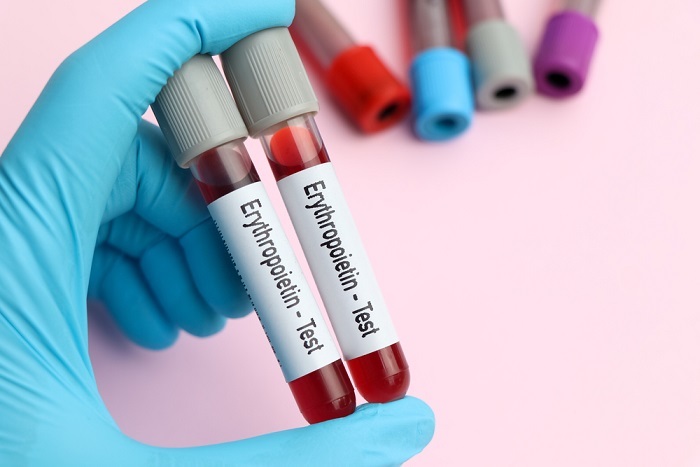
 Data Structure
Data Structure Networking
Networking RDBMS
RDBMS Operating System
Operating System Java
Java MS Excel
MS Excel iOS
iOS HTML
HTML CSS
CSS Android
Android Python
Python C Programming
C Programming C++
C++ C#
C# MongoDB
MongoDB MySQL
MySQL Javascript
Javascript PHP
PHP
- Selected Reading
- UPSC IAS Exams Notes
- Developer's Best Practices
- Questions and Answers
- Effective Resume Writing
- HR Interview Questions
- Computer Glossary
- Who is Who
Erythropoietin (EPO): Function, Mechanism, and Clinical Significance
What is Erythropoietin?
Erythropoietin EPO is a glycoprotein hormone, naturally produced by the peritubular cells of the kidney to stimulate red blood cells. Erythropoietin that our kidneys primarily produce helps the body to maintain a healthy number of erythrocytes.
Irregular levels of erythropoietin can cause health problems. The accurate level of erythropoietin can be measured with a blood test. Synthetic or man-made forms of erythropoietin are also available, that doctors may use to treat anemia that results from chronic kidney disease.
Some athletes use this drug inappropriately to boost their performance because EPO increases the availability of oxygen to the muscles. Erythropoietin is alternatively called hematopoietin, hemopoietin, and erythropoietin.

The Function of Erythropoietin?
Erythropoietin functions in making red blood cells. It acts on red blood cells to protect them against destruction. Simultaneously, it activates the stem cells of the bone marrow to increase the production of red blood cells.
These RBCs deliver oxygen to all the tissues in our body and turn into energy. Red blood cells also transport carbon dioxide released by the tissues to the lungs for you to exhale. Normally, when kidneys detect low blood oxygen levels they start to increase the production of EPO. EPO signals the bone marrow or the spongy tissue inside your bones to produce more red blood cells.
Likewise, when cells in our kidneys sense that there's sufficient oxygen in our blood, they automatically reduce the production of erythropoietin.
Under certain diseased conditions, the level of EPO in our kidneys may vary they may make too much or too low. This results in low or high levels of red blood cells. EPO also functions in the wound-healing process.
Likewise, erythropoiesis, erythropoietin also has other known biological functions, it plays a vital role in the brain's response to neuronal injury.
Mechanism of Action
Erythropoietin stimulating agents and endogenous erythropoietin activates the division and separation of erythroid progenitor cells. Very early-developing erythrocytes contain these EPO receptors on the surface of CD34+ hematopoietic stem cells.
The binding of these endogenous EPO or recombinant analogs creates a cellular signaling spout, promotes cell proliferation, and prevents apoptosis by activating genes. Which results in an increase in total body hematocrit or hemoglobin.
Normal EPO Levels?
The EPO in your blood is measured in milliunits per milliliter (mU/mL).
The normal range for EPO will be between 4 to 26 mU/mL.
EPO test results may differ according to various factors, including.
Age.
Overall health.
Biological sex.
After a careful diagnosis, your healthcare provider will carefully illustrate the test results and let you know if the levels are healthy or out of range.
Causes for High Levels of EPO?
Very high levels of erythropoietin can increase the levels of red blood cells. Another name for high levels of red blood cells is polycythemia. Chronic exposure to low levels of oxygen can also increase EPO levels.

Smoking or living in a polluted or high-hilly area where air oxygen levels are lower may also cause high levels of EPO. Anemia also causes high EPO levels it may not result from kidney disease and still can cause high levels of EPO. Anemia is a condition, that happens when there are not enough red blood cells produced or they don't work as normal.
This may cause high levels of EPO because your kidneys feel that there are not enough red blood cells, so they release extra EPO. Certain tumors can also cause your kidneys to release excessive EPO inadequately.
Causes for Low Levels of Erythropoietin?
The most common cause of low EPO levels is Chronic kidney disease (CKD). It is a condition where damaged kidneys can't produce as much EPO, low levels of CKD and low EPO levels can also lead to anemia.
Low levels of EPO may cause polycythemia vera, it is a type of blood cancer that causes bone marrow to produce extreme number of red blood cells due to a genetic mutation. It causes low EPO levels.
Treating Low Erythropoietin Levels?
Low levels of EPO require treating the underlying cause. The most common treatment is recombinant erythropoietin (erythropoietin-stimulating agents or ESAs). With this we can directly correct anemia due to low EPO levels.
This is a synthetic version of natural EPO. Specialists clone the gene for EPO and give them an injection shot to activate the production of more red blood cells.
Doctors recommend it to treat anemia that results from incessant kidney failure. it is also recommended for some people with rare types of cancer.
Erythropoietin-stimulating agents also cause.
Pain at the injection site.
Nausea.
High blood pressure.
Fever.
Dizziness
How to Measure EPO?
EPO is measured through a blood test that helps to determine the cause that make change in our blood cells that affects the release of EPO, including anemia or bone marrow conditions and polycythemia.
Once the lab technician finishes testing the blood sample, you can visit a specialist or a healthcare provider to discuss the test results. Even if EPO levels are within a normal range, one may still require a treatment.
FAQs
Q1. How to increase erythropoietin levels naturally?
Ans. People with any anemia or CKD with low EPO, can follow the diet and lifestyle changes that help to boost EPO levels ?
Dietary iron The primary element of hemoglobin is iron which helps to carry oxygen to cells in your body.
Iron-rich foods include liver, egg yolk, tofu, red meat, and iron-fortified food such as cereal, flour, and bread.
Exercise According to research regular and vigorous exercise causes our body to use more amount of oxygen. According to that, our brain instructs our body to create more EPO in response.
A few examples of vigorous exercise include jogging, swimming, and bicycling.
Outline
Erythropoietin is the most vital and essential hormone that instructs the bone marrow when to produce more red blood cells. At times our body inadequately produces too many or too few red blood cells, which leads to several health problems.
A healthcare provider or a specialist can recommend a blood test to see the level of EPO in the blood and advice proper treatment.
Clinical Significance
As discussed above erythropoietin is a glycoprotein produced by the kidney in response to tissue hypoxia.
It is the principal factor regulating the red blood cell production. It activates erythroid precursors in the bone marrow to generate and mature into morphologically identifiable red blood cells.
This hormone acts by binding to specific receptors on erythroid precursors and fails to produce enough quantities of EPO which leads to severe anemia.
Application of recombinant DNA technology, made the gene for this hormone that was molecularly cloned, sequenced, and expressed.
This recombinant EPO has been established to cure anemia in patients with severe kidney disease and relieve their transfusion requirements.
When administered with the proper guidelines EPO appears to be a safe drug with a positive benefit and risk ratio.

